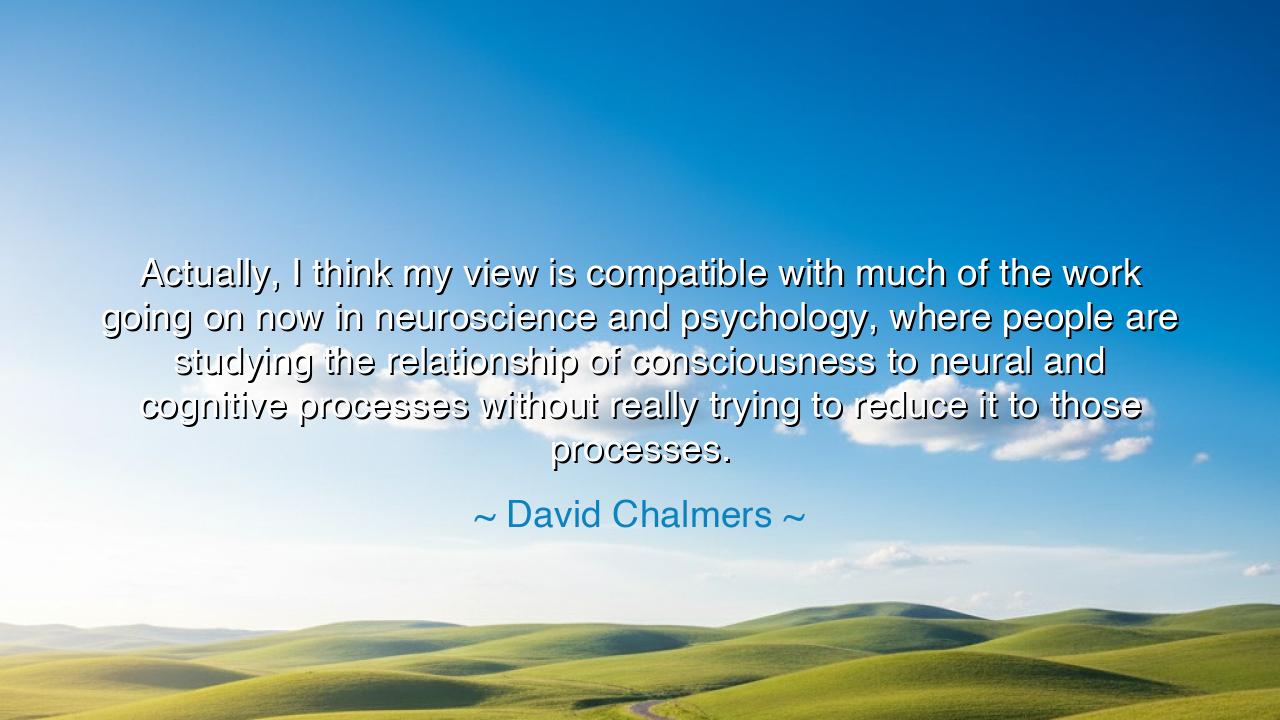
Actually, I think my view is compatible with much of the work
Actually, I think my view is compatible with much of the work going on now in neuroscience and psychology, where people are studying the relationship of consciousness to neural and cognitive processes without really trying to reduce it to those processes.






In the profound words of David Chalmers, “Actually, I think my view is compatible with much of the work going on now in neuroscience and psychology, where people are studying the relationship of consciousness to neural and cognitive processes without really trying to reduce it to those processes,” we hear the voice of a seeker of truth grappling with one of the greatest mysteries of existence. Consciousness, the inner flame of awareness, has long puzzled philosophers and scientists alike. Chalmers speaks of a path that honors the study of the mind’s physical workings while recognizing that the essence of awareness cannot be wholly contained or diminished by material explanation.
The origin of this wisdom lies in the ancient debates between those who saw the soul as divine and immaterial, and those who sought to understand the mind through the body. In the temples of India, sages pondered the Atman—the eternal self—while in Greece, thinkers like Aristotle studied perception and reason. The modern fields of neuroscience and psychology are the heirs of these ancient pursuits, striving to uncover how the brain’s neural processes give rise to thought and experience. Yet, as Chalmers reminds us, there remains something in consciousness that resists full capture by scientific description, a mystery that humbles even the most brilliant minds.
To reduce consciousness entirely to physical processes is to risk losing its wonder. The beating of the heart can be measured, the firing of neurons observed, but the feeling of joy, grief, or wonder—the raw essence of being—remains elusive. Chalmers calls for harmony rather than conquest: to study the relationship between the inner and the outer without seeking to erase one in favor of the other. This is a vision of balance, where knowledge grows without diminishing the mystery it seeks to understand.
Thus, his words stand as guidance for future generations of thinkers. Let those who labor in the fields of neuroscience and psychology approach their work with both rigor and reverence, knowing that they walk the same path trodden by ancient philosophers and mystics. For to explore consciousness is to gaze upon the deepest truth of existence, a truth that may never be fully reduced, but can always be approached with curiosity, humility, and awe.






NSNguyen Sang
David Chalmers' view on consciousness challenges us to think deeply about how we understand the mind and its relationship to the brain. If science is studying consciousness without reducing it to neural processes, what does that mean for our understanding of free will and subjective experience? Is it possible to study consciousness without oversimplifying it? How do we capture the essence of subjective experience while still adhering to scientific methodologies?
HBLuu Thu Huong BS
I find Chalmers' viewpoint on consciousness in relation to neural and cognitive processes quite compelling. It seems like the scientific community is grappling with how to explain consciousness without reducing it to purely biological terms. How do you think we can study consciousness more effectively while respecting its subjective nature? Can we ever fully explain consciousness if we continue to treat it as something separate from the brain’s physical processes?
TTTram Tran
Chalmers brings an interesting perspective to the ongoing debate in neuroscience about consciousness. The fact that many researchers are studying consciousness without simplifying it to mere neural or cognitive processes seems like a balanced approach. But is it possible that we’re overlooking important aspects of consciousness by not trying to reduce it to these processes? Could the complexity of consciousness be better understood if we directly linked it to its neural underpinnings?
DTTran Thi Diem Thuong
David Chalmers makes an intriguing point about the relationship between consciousness and neural/cognitive processes. It’s fascinating that neuroscience and psychology are studying this link without trying to reduce consciousness entirely to brain activity. Does this mean that there’s something about consciousness that we can't fully explain through physical processes? How do we reconcile the subjective experience of consciousness with the objective findings of science? Can we truly understand consciousness without reducing it to biology?